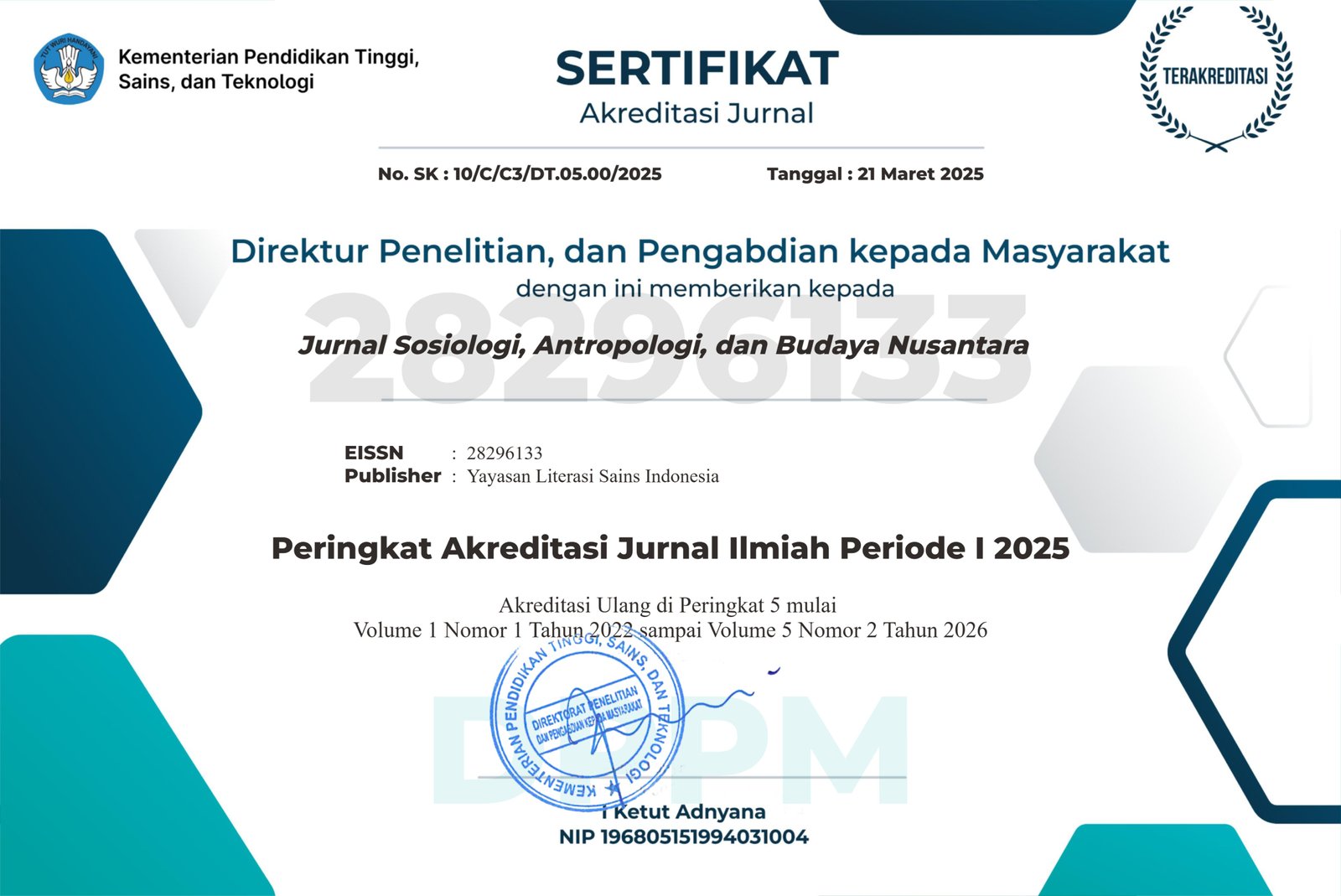KEBIJAKAN PEMERINTAH DALAM MEMBANGUN KETENAGAKERJAAN YANG BERKELANJUTAN UNTUK MENSEJAHTERAKAN KEHIDUPAN MASYARAKAT
DOI:
https://doi.org/10.55123/sabana.v3i2.3306Keywords:
Employment, Competitiveness, Reform, Government PolicyAbstract
Indonesia is facing quite complex employment problems. This contributes to the development of human resource competencies in Indonesia to be able to compete at the national, regional, and international levels. Government policy on sustainable employment is the main focus in creating an inclusive, sustainable, and future-oriented work environment. This paper aims to analyze the strategies and policies implemented by the government to improve sustainable employment development. The workforce in Indonesia still has various problems, such as high unemployment rates, low quality of workforce, wages, social security, and so on. This analysis also discusses challenges and opportunities in dealing with labor issues, this paper also implements the concept of competitiveness. Through this concept, it is found that efforts to increase competitiveness can start from the substance of the labor sector such as skills and infrastructure. Then, increasing competitiveness also requires reform of the employment system which is regulated in such a way by the government to obtain better quality human resources in the future.
Downloads
References
A. Hayati, “IMPLEMENTASI KEBIJAKAN MENGURANGI PENGANGGURAN PERKOTAAN PADA DINAS KETENAGAKERJAAN KOTA LUBUKLINGGAU,” Pengangguran PAsira: Journal of Public Administration Musi Raya, vol. 4, no. 1, 2021, Accessed: Mar. 27, 2024. [Online]. Available: https://download.garuda.kemdikbud.go.id/article.php? article=3249308&val=28481&title=IMPLEMENTASI%20KEBIJAKAN%20MENGURANGI%20PENGANGGURAN%20PERKOTAAN%20PADA%20DINAS%20KETENAGAKERJAAN%20KOTA%20LUBUKLINGGAU
E. Alaniz, T. H. Gindling, C. Mata, and D. Rojas, “Transforming informal work and livelihoods in Costa Rica and Nicaragua,” RePEc: Research Papers in Economics, Aug. 2020, doi: https://doi.org/10.13016/m2tlaz-lu6t.
Nur Putri Hidayah, Q. R. Cloet, and D. Pradhan, “The Implementation of Labor Development Principles According to Job Creation Law as a Reason to Protect Wages Rights,” Sukowati Pos: Peduli, Mengerti Kerjasama Untuk Negeri, vol. 9, no. 1, pp. 94–94, Aug. 2021, doi: https://doi.org/10.20961/bestuur.v9i1.49252.
A. Kolot, S. Kozmenko, O. Herasymenko, and D. Štreimikienė, “Development of a decent work institute as a social quality imperative: Lessons for Ukraine,” Economics & Sociology, vol. 13, no. 2, pp. 70–85, Jun. 2020, doi: https://doi.org/10.14254/2071-789x.2020/13-2/5.
“Pengangguran Februari 2020 Meningkat Jadi 6,68 Juta Orang Databoks,” databoks.katadata.co.id.https://databoks.katadata.co.id/datapublish/2020/05/05/pengangguran-februari-2020-meningkat-jadi-668-juta-orang (accessed Aug. 01, 2020).
B. P. S. Indonesia, “Februari 2020: Tingkat Pengangguran Terbuka (TPT) sebesar 4,99 persen,” www.bps.go.id. https://www.bps.go.id/id/ pressrelease /2020/05/05/1672/february-2020 (accessed Mar. 27, 2024).
S. Simmau and S. M. Lagaligo, “Strategi Pemberdayaan Ekonomi Pencari Kerja Usia Muda Berbasis Minat dan Sumber Daya Sosial Ekonomi Setempat pada Masyarakat Pesisir di Kota Makassar,” Hasanuddin Journal of Sociology, pp. 139–154, Dec. 2019, doi: https://doi.org/10.31947/hjs.v1i2.9433.
R. Dewi and H. T. Rfs, “STRATEGI DINAS TENAGA KERJA DAN TRANSMIGRASI KOTA DUMAI DALAM MENGURANGI TINGKAT PENGANGGURAN DI KOTA DUMAI,” Jurnal Online Mahasiswa (JOM) Bidang Ilmu Sosial dan Ilmu Politik, vol. 7, no. 2, pp. 1–15, 2020, Accessed: Mar. 27, 2024. [Online]. Available: https://jnse.ejournal.unri.ac.id/index.php/ JOMFSIP/article/view/28761/27719
A. N. Virgiawan, D. M. Syifa, and E. Faralita, “Kebaruan Hukum Ketenagakerjaan Setelah Lahir Undang-undang Cipta Kerja,” Journal of International Multidisciplinary Research, vol. 1, no. 2, pp. 889–898, Dec. 2023, doi: https://doi.org/10.62504/d6nkw771.
Sugiyono, Metode Penelitian Pendidikan. Bandung: Alfabeta, 2015.
H. Wijayanto and S. Ode, “DINAMIKA PERMASALAHAN KETENAGAKERJAAN DAN PENGANGGURAN DI INDONESIA,” Administratio: Jurnal Ilmiah Administrasi Publik dan Pembangunan, vol. 10, no. 1, pp. 1–8, Aug. 2019, doi:https://doi.org/10.23960/administratio.v10i1. 82.
S Laurensius Arliman, “Perkembangan dan Dinamika Hukum Ketenagakerjaan di Indonesia,” Jurnal Selat, vol. 5, no. 1, pp. 74–87, Jan. 2017.
D. Purwanti, C. Wijaya, Dine Meigawati, and Haidan Angga Kusumah, “FORMULASI PERDA KETENAGAKERJAAN KOTA SUKABUMI DALAM SUDUT PANDANG AKADEMIK,” JIPAGS (Journal of Indonesian Public Administration and Governance Studies), vol. 5, no. 1, Jan. 2021, doi: https://doi.org/10.31506/jipags.v5i1.9464.
M. F. Imam and T. T, “ADVOKASI KEBIJAKAN KETENAGAKERJAAN (STUDI KASUS IDFoS INDONESIA),” Publika, pp. 1331–1346, Jul. 2022, doi: https://doi.org/10.26740/publika.v10n4.p1331-1346.
Sindy Yulia Putri, “Upaya Pemerintah Indonesia di Era Pemerintahan Presiden Joko Widodo dalam Meningkatkan Daya Saing Sektor Ketenagakerjaan,” Jurnal Kajian Lemhannas RI, vol. 6, no. 3, pp. 19–33, Jan. 2018.
S. L. M. Muthoharoh and A. Wahyudi, “Pengelolaan Ketenagakerjaan dan Pengangguran dalam Islam: Sebab, Dampak, dan Solusi,” Jurnal Masharif Al-Syariah: Jurnal Ekonomi dan Perbankan Syariah, vol. 8, no. 3, Oct. 2023, doi: https://doi.org/10.30651/jms.v8i3.20479.
Ujang Charda, “REFORMASI POLITIK HUKUM KETENAGAKERJAAN DALAM KEBIJAKAN PEMERINTAH INDONESIA,” vol. 31, no. 2, pp.121–153, Apr. 2016, doi: https://doi.org/10.25072/jwy.v31i2.79.
L. Adam, “MEMBANGUN DAYA SAING TENAGA KERJA INDONESIA MELALUI PENINGKATAN PRODUKTIVITAS,” Jurnal Kependudukan Indonesia, vol. 11, no. 2, p. 71, Jan. 2017, doi: https://doi.org/10.14203/jki.v11i2.205
Downloads
Published
How to Cite
Issue
Section
License
Copyright (c) 2024 Junaheni Afifah, Mirna Nur Alia Abdullah

This work is licensed under a Creative Commons Attribution 4.0 International License.


























